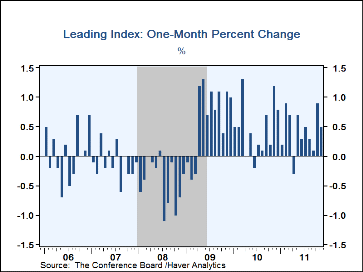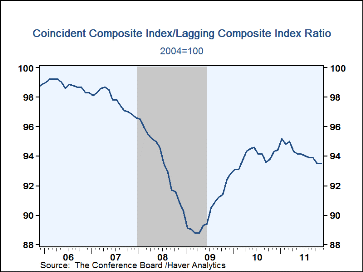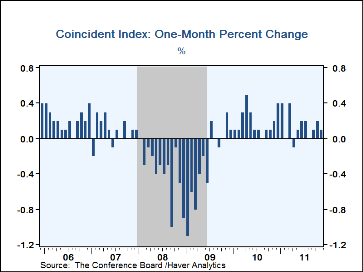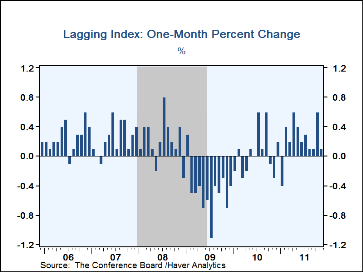 Global| Dec 22 2011
Global| Dec 22 2011U.S. Leading Indicators Continue Upward
by:Tom Moeller
|in:Economy in Brief
Summary
The Conference Board reported that its Leading Economic Indicators index rose 0.5% during November following an unrevised 0.9% October jump. The gain beat the Consensus forecast for a 0.3% increase. The breadth of increase amongst the [...]
The Conference Board reported that its Leading Economic Indicators index rose 0.5% during November following an unrevised 0.9% October jump. The gain beat the Consensus forecast for a 0.3% increase. The breadth of increase amongst the leader's components continued wide as 70% rose versus October. The rise in the index reflected a steeper interest rate yield curve, higher building permits, stronger money supply growth, higher stock prices, fewer claims for unemployment insurance and improved consumer expectations. Vendor performance provided a negative influence as the speed of deliveries quickened. Also, average weekly hours fell as did factory orders for consumer goods.
Evidence of current economic weakness also was in the Conference Board's report. The index of coincident indicators ticked up just 0.1% after a 0.2% October rise. As calculated by the Conference Board, the index rose at a moderate 1.6% rate during the last six months. The 1-month diffusion index of the indicators slipped to 75% as payroll employment, real personal income and business sales rose but industrial production fell.
In a sign that the buildup of economic excesses eased, the November lagging indicator index rose just 0.1%. The ratio of coincident-to-lagging indicators, which tends to "lead" the "leaders," was unchanged at its lowest level since February 2010.
The Conference Board figures are available in Haver's BCI database; the components are available there, and most are also in USECON. The forecast figure is the Consensus in the AS1REPNA database. Visit the Conference Board's site for coverage of leading indicator series from around the world.
| Business Cycle Indicators (%) | Nov | Oct | Sep | Y/Y | 2010 | 2009 | 2008 |
|---|---|---|---|---|---|---|---|
| Leading | 0.5 | 0.9 | 0.1 | 5.9 | 7.8 | 0.3 | -3.1 |
| Coincident | 0.1 | 0.2 | 0.1 | 2.0 | 1.1 | -5.4 | -1.3 |
| Lagging | 0.1 | 0.6 | 0.1 | 2.8 | -2.9 | -1.9 | 3.1 |
Tom Moeller
AuthorMore in Author Profile »Prior to joining Haver Analytics in 2000, Mr. Moeller worked as the Economist at Chancellor Capital Management from 1985 to 1999. There, he developed comprehensive economic forecasts and interpreted economic data for equity and fixed income portfolio managers. Also at Chancellor, Mr. Moeller worked as an equity analyst and was responsible for researching and rating companies in the economically sensitive automobile and housing industries for investment in Chancellor’s equity portfolio. Prior to joining Chancellor, Mr. Moeller was an Economist at Citibank from 1979 to 1984. He also analyzed pricing behavior in the metals industry for the Council on Wage and Price Stability in Washington, D.C. In 1999, Mr. Moeller received the award for most accurate forecast from the Forecasters' Club of New York. From 1990 to 1992 he was President of the New York Association for Business Economists. Mr. Moeller earned an M.B.A. in Finance from Fordham University, where he graduated in 1987. He holds a Bachelor of Arts in Economics from George Washington University.
More Economy in Brief
 Global| Feb 05 2026
Global| Feb 05 2026Charts of the Week: Balanced Policy, Resilient Data and AI Narratives
by:Andrew Cates










